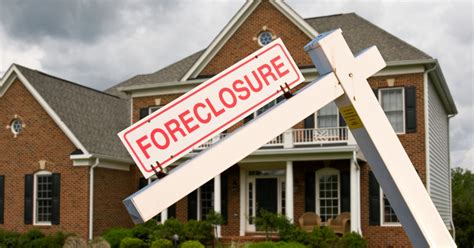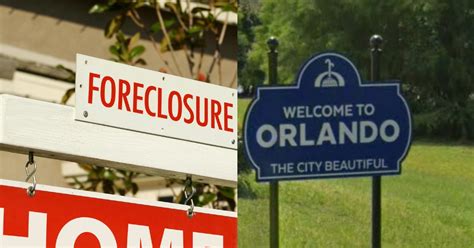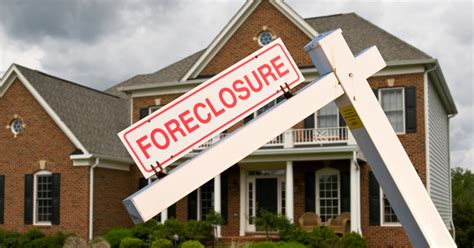
Cape Coral-Fort Myers, Florida, is grappling with the highest foreclosure rate in the United States, exceeding pre-pandemic levels as federal aid dries up and unique local factors exacerbate the crisis. The metro area, which includes both Lee and Collier counties, reported one in every 1,887 housing units with a foreclosure filing in March, according to ATTOM Data Solutions, signaling significant distress in the housing market.
The surge in foreclosures in Cape Coral-Fort Myers reflects a complex interplay of factors, including the cessation of pandemic-era financial assistance, rising insurance costs, and the lingering economic fallout from Hurricane Ian. While foreclosure rates nationally remain below historical averages, this Florida region stands out as an exception, raising concerns about the financial stability of homeowners and the overall health of the local economy. The situation also underscores the vulnerability of certain segments of the population, particularly those with lower incomes or limited savings, to economic shocks and rising housing costs.
Foreclosure Surge Driven by Multiple Factors
Several converging elements contribute to the foreclosure crisis in Cape Coral-Fort Myers. A primary driver is the expiration of pandemic-era foreclosure moratoriums and financial aid programs. These measures, implemented to protect homeowners during the COVID-19 pandemic, provided a crucial safety net that temporarily shielded many from losing their homes. With these protections now lifted, homeowners who were already struggling financially are facing renewed pressure.
“The Florida market is seeing higher foreclosure rates compared to other states, mostly driven by the delayed court processing timelines,” said Marina Shtyrkov, VP of Research and Analytics at ATTOM Data Solutions. “In addition to that, Hurricane Ian had a devastating impact on property values in the Cape Coral and Fort Myers areas.”
Another significant factor is the escalating cost of homeowners insurance in Florida. The state’s insurance market has been plagued by instability in recent years, with numerous companies either going bankrupt or withdrawing from the state altogether. This has led to reduced competition and skyrocketing premiums, placing an additional financial burden on homeowners, particularly those in coastal areas like Cape Coral-Fort Myers, which are highly susceptible to hurricanes and other natural disasters.
The lingering economic impact of Hurricane Ian, which devastated the region in September 2022, has also played a significant role. The hurricane caused widespread damage to homes and businesses, resulting in job losses and economic disruption. Many homeowners are still struggling to repair their properties and cope with the financial consequences of the storm, making it difficult for them to keep up with their mortgage payments. The combination of these factors has created a perfect storm, leading to the surge in foreclosures observed in the region.
The crisis is not evenly distributed across the population. Low-income homeowners and those with limited financial resources are disproportionately affected. These individuals are often less able to absorb unexpected expenses, such as increased insurance premiums or storm-related repairs, making them more vulnerable to foreclosure. Additionally, many residents of Cape Coral-Fort Myers work in the tourism and hospitality industries, which were severely impacted by the pandemic and Hurricane Ian, further exacerbating their financial difficulties.
National Context and Regional Disparities
While Cape Coral-Fort Myers is experiencing a particularly acute foreclosure crisis, it’s important to consider the national context. Overall, foreclosure rates in the United States remain relatively low compared to historical averages. However, there are significant regional disparities, with some areas, like Cape Coral-Fort Myers, experiencing much higher rates than others. These disparities reflect differences in local economic conditions, housing markets, and regulatory environments.
Nationally, the foreclosure rate has been steadily increasing since the end of the pandemic-era moratoriums, but it is still below pre-pandemic levels. This suggests that the overall housing market remains relatively healthy, but there are pockets of vulnerability, particularly in areas that have been hit hard by economic shocks or natural disasters.
The situation in Cape Coral-Fort Myers highlights the importance of understanding local factors when assessing the health of the housing market. National trends can be misleading if they don’t account for the unique circumstances of individual regions. In this case, the combination of rising insurance costs, hurricane damage, and the expiration of pandemic-era aid has created a perfect storm that is driving up foreclosure rates in the area.
The high foreclosure rate in Cape Coral-Fort Myers raises concerns about the stability of the local housing market and the potential for further economic disruption. If foreclosure rates continue to rise, it could lead to a decline in property values, which could negatively impact homeowners and the overall economy. Additionally, the increase in foreclosures could strain local government resources, as they are forced to deal with the consequences of homelessness and displacement.
Policy Responses and Potential Solutions
Addressing the foreclosure crisis in Cape Coral-Fort Myers will require a multi-faceted approach that takes into account the unique challenges facing the region. Some potential policy responses and solutions include:
- Financial Assistance Programs: Implementing targeted financial assistance programs to help homeowners struggling to pay their mortgages and insurance premiums. These programs could provide grants, loans, or other forms of assistance to help homeowners stay in their homes.
- Insurance Reform: Addressing the instability in Florida’s insurance market by implementing reforms that promote competition and lower premiums. This could include measures to attract new insurance companies to the state, reduce regulatory burdens, and incentivize mitigation efforts to reduce the risk of hurricane damage.
- Disaster Relief: Providing additional disaster relief assistance to homeowners who are still struggling to recover from Hurricane Ian. This could include grants for home repairs, assistance with insurance claims, and access to affordable housing.
- Housing Counseling: Expanding access to housing counseling services to help homeowners understand their options and navigate the foreclosure process. Housing counselors can provide advice on budgeting, debt management, and foreclosure prevention.
- Legal Aid: Providing legal aid to homeowners who are facing foreclosure. Legal aid attorneys can help homeowners understand their rights and represent them in court.
- Community Development: Investing in community development initiatives to create jobs and improve economic opportunities in the region. This could include programs to attract new businesses, support small businesses, and provide job training.
These are just a few of the potential solutions that could be implemented to address the foreclosure crisis in Cape Coral-Fort Myers. The most effective approach will likely involve a combination of these and other strategies, tailored to the specific needs of the community. It’s also crucial to be proactive and implement preventive measures to help homeowners avoid foreclosure in the first place.
Impact on the Real Estate Market
The surge in foreclosures in Cape Coral-Fort Myers is inevitably impacting the local real estate market. An increased supply of foreclosed properties can put downward pressure on home prices, affecting not only those facing foreclosure but also other homeowners in the area. Potential buyers may be hesitant to invest in a market perceived as unstable, further exacerbating the situation.
Realtors and real estate agents are adapting to this changing landscape. They are working with clients to understand the market dynamics, providing guidance on pricing strategies, and helping buyers navigate the complexities of purchasing foreclosed properties. Transparency and accurate information are crucial during this time to maintain confidence in the market.
Investors may also see opportunities in the foreclosure crisis. Buying foreclosed properties at potentially discounted prices and renovating them can contribute to revitalizing neighborhoods. However, ethical considerations are paramount, and investors should avoid predatory practices that could exploit vulnerable homeowners.
Long-Term Implications and Future Outlook
The long-term implications of the foreclosure crisis in Cape Coral-Fort Myers are significant. If left unaddressed, the crisis could lead to increased poverty, homelessness, and social unrest. It could also damage the region’s reputation as a desirable place to live and work, potentially hindering economic growth in the long term.
Looking ahead, it’s difficult to predict exactly how the situation will unfold. However, several factors will likely play a role in shaping the future outlook. These include the effectiveness of policy responses, the performance of the national economy, and the severity of future natural disasters.
It is clear that the Cape Coral-Fort Myers metro area needs comprehensive strategies involving government, community organizations, and the private sector to mitigate the ongoing foreclosure crisis. The collaboration of these entities can help to develop a sustainable housing market where residents have equitable opportunities to maintain homeownership.
FAQ: Cape Coral-Fort Myers Foreclosure Crisis
Q1: What is causing the high foreclosure rate in Cape Coral-Fort Myers, Florida?
A1: The surge in foreclosures in Cape Coral-Fort Myers is due to a combination of factors. These include the expiration of pandemic-era financial assistance programs that provided foreclosure moratoriums, escalating homeowners insurance costs, especially after Hurricane Ian, and the lingering economic impact of the hurricane on the region. The delayed court processing timelines in Florida also contribute to the increase in foreclosure rates, according to ATTOM Data Solutions.
Q2: How does the foreclosure rate in Cape Coral-Fort Myers compare to the national average?
A2: The foreclosure rate in Cape Coral-Fort Myers is significantly higher than the national average. As of March, the metro area reported one in every 1,887 housing units with a foreclosure filing, making it the highest in the United States. While foreclosure rates nationally are below historical averages, Cape Coral-Fort Myers stands out as an exception, indicating a unique and severe housing crisis in the region.
Q3: Who is most affected by the foreclosure crisis in Cape Coral-Fort Myers?
A3: The foreclosure crisis disproportionately affects low-income homeowners and those with limited financial resources. These individuals are often less able to absorb unexpected expenses, such as increased insurance premiums or storm-related repairs, making them more vulnerable to foreclosure. Additionally, residents working in tourism and hospitality, sectors heavily impacted by the pandemic and Hurricane Ian, are particularly at risk.
Q4: What steps are being taken to address the foreclosure crisis in Cape Coral-Fort Myers?
A4: Several policy responses and potential solutions are being considered and implemented. These include targeted financial assistance programs to help homeowners with mortgage and insurance payments, efforts to reform Florida’s unstable insurance market, providing additional disaster relief to homeowners recovering from Hurricane Ian, expanding access to housing counseling services, and providing legal aid to homeowners facing foreclosure. Also, investments in community development initiatives aim to create jobs and improve economic opportunities in the region.
Q5: What is the long-term outlook for the housing market in Cape Coral-Fort Myers?
A5: The long-term outlook for the housing market in Cape Coral-Fort Myers is uncertain and depends on several factors. These include the effectiveness of policy responses to address the crisis, the overall performance of the national economy, and the potential for future natural disasters. If the crisis is not addressed effectively, it could lead to increased poverty, homelessness, and social unrest, potentially damaging the region’s reputation and hindering long-term economic growth. A comprehensive and collaborative approach involving government, community organizations, and the private sector is needed to mitigate the crisis and foster a sustainable housing market.
Extended Analysis and Additional Information:
Insurance Crisis Deep Dive
The escalating cost of homeowners insurance in Florida is not a new issue, but it has reached crisis proportions in recent years, particularly impacting areas like Cape Coral-Fort Myers. Several factors contribute to this instability:
- High Risk of Natural Disasters: Florida’s location makes it highly susceptible to hurricanes, tropical storms, and flooding. This inherent risk leads to higher insurance premiums, as insurers face a greater likelihood of paying out claims.
- Litigation and Fraud: Florida has been plagued by excessive litigation and fraudulent claims related to property damage. This increases the cost of doing business for insurers, who pass these costs on to consumers in the form of higher premiums.
- Reinsurance Costs: Insurance companies often purchase reinsurance to protect themselves from catastrophic losses. The cost of reinsurance has been rising, further driving up insurance premiums for homeowners.
- Company Insolvencies: Several insurance companies have become insolvent or withdrawn from the Florida market due to financial losses. This reduces competition and further exacerbates the problem of high premiums.
Addressing the insurance crisis will require a multi-pronged approach that includes:
- Tort Reform: Implementing reforms to reduce excessive litigation and fraudulent claims.
- Strengthening Building Codes: Enforcing stricter building codes to make homes more resilient to hurricane damage.
- Incentivizing Mitigation: Providing incentives for homeowners to take steps to protect their homes from natural disasters, such as installing hurricane shutters or reinforcing roofs.
- Attracting New Insurers: Creating a more attractive regulatory environment to encourage new insurance companies to enter the Florida market.
Hurricane Ian’s Lingering Impact
Hurricane Ian’s devastation of Cape Coral-Fort Myers in September 2022 has had a profound and lasting impact on the region’s economy and housing market. The storm caused widespread damage to homes, businesses, and infrastructure, resulting in significant job losses and economic disruption.
Many homeowners are still struggling to repair their properties and cope with the financial consequences of the storm. Insurance claims have been slow to process, and many homeowners have been underinsured or denied coverage altogether. This has left them with significant out-of-pocket expenses, making it difficult for them to keep up with their mortgage payments.
The hurricane also exacerbated existing housing shortages in the region, as many homes were destroyed or rendered uninhabitable. This has driven up rental prices and made it even more difficult for low-income residents to find affordable housing.
To address the lingering impact of Hurricane Ian, it is crucial to:
- Expedite Insurance Claims: Streamline the insurance claims process and provide assistance to homeowners who are having difficulty navigating the system.
- Provide Disaster Relief: Provide additional disaster relief assistance to homeowners and businesses who are still struggling to recover from the storm.
- Rebuild Infrastructure: Invest in rebuilding damaged infrastructure, such as roads, bridges, and utilities.
- Address Housing Shortages: Implement policies to increase the supply of affordable housing in the region.
Demographic and Socioeconomic Factors
The foreclosure crisis in Cape Coral-Fort Myers is also linked to underlying demographic and socioeconomic factors. The region has a large population of retirees and seasonal residents, many of whom have fixed incomes. These individuals are particularly vulnerable to economic shocks and rising housing costs.
Additionally, the region has a significant number of low-wage workers in the tourism and hospitality industries. These workers are often employed in precarious jobs with limited benefits, making them more susceptible to financial hardship.
Addressing these underlying issues will require:
- Investing in Education and Job Training: Providing access to education and job training programs to help residents acquire the skills they need to secure higher-paying jobs.
- Increasing the Minimum Wage: Raising the minimum wage to ensure that workers can earn a living wage.
- Expanding Access to Affordable Healthcare: Providing access to affordable healthcare to reduce the financial burden on low-income residents.
- Strengthening Social Safety Nets: Strengthening social safety nets to provide a safety net for those who are struggling to make ends meet.
The Role of Local Government
Local government plays a crucial role in addressing the foreclosure crisis in Cape Coral-Fort Myers. Local officials can implement policies to:
- Provide Housing Counseling: Partner with local organizations to provide housing counseling services to homeowners who are at risk of foreclosure.
- Offer Mediation Services: Offer mediation services to help homeowners and lenders reach agreements to avoid foreclosure.
- Enforce Fair Housing Laws: Enforce fair housing laws to prevent discrimination in housing.
- Invest in Affordable Housing: Invest in the development of affordable housing to address housing shortages.
- Promote Economic Development: Promote economic development to create jobs and improve economic opportunities in the region.
Community-Based Solutions
In addition to government action, community-based solutions can also play a vital role in addressing the foreclosure crisis. Local organizations and community groups can:
- Provide Financial Literacy Training: Provide financial literacy training to help residents manage their finances and avoid debt.
- Offer Foreclosure Prevention Workshops: Offer foreclosure prevention workshops to educate homeowners about their options.
- Advocate for Policy Changes: Advocate for policy changes to address the root causes of the foreclosure crisis.
- Organize Community Support Networks: Organize community support networks to provide assistance to families who are facing foreclosure.
- Volunteer Time and Resources: Volunteer time and resources to help those in need.
Preventing Future Crises
While addressing the current foreclosure crisis is crucial, it is also important to take steps to prevent future crises from occurring. This includes:
- Promoting Responsible Lending: Promoting responsible lending practices to ensure that borrowers can afford their mortgages.
- Strengthening Consumer Protections: Strengthening consumer protections to prevent predatory lending practices.
- Educating Consumers about Financial Risks: Educating consumers about the financial risks of homeownership.
- Monitoring the Housing Market: Monitoring the housing market to identify potential problems early on.
- Developing Contingency Plans: Developing contingency plans to address future economic shocks or natural disasters.
By taking these steps, we can help to ensure that the Cape Coral-Fort Myers region is more resilient to future economic challenges and that all residents have the opportunity to achieve the dream of homeownership.
The situation in Cape Coral-Fort Myers serves as a cautionary tale about the importance of addressing the underlying vulnerabilities in the housing market and protecting homeowners from economic shocks. It also highlights the need for a comprehensive and collaborative approach that involves government, community organizations, and the private sector.
The road to recovery will be long and challenging, but by working together, the residents of Cape Coral-Fort Myers can rebuild their lives and create a more resilient and equitable community. This requires not only immediate relief efforts but also long-term strategies to address the systemic issues that contributed to the crisis. Furthermore, a commitment to transparency and open communication will be vital in fostering trust and ensuring that resources are effectively allocated to those who need them most. The focus must remain on empowering residents and providing them with the tools and support they need to navigate these challenging times and build a brighter future for themselves and their families.









